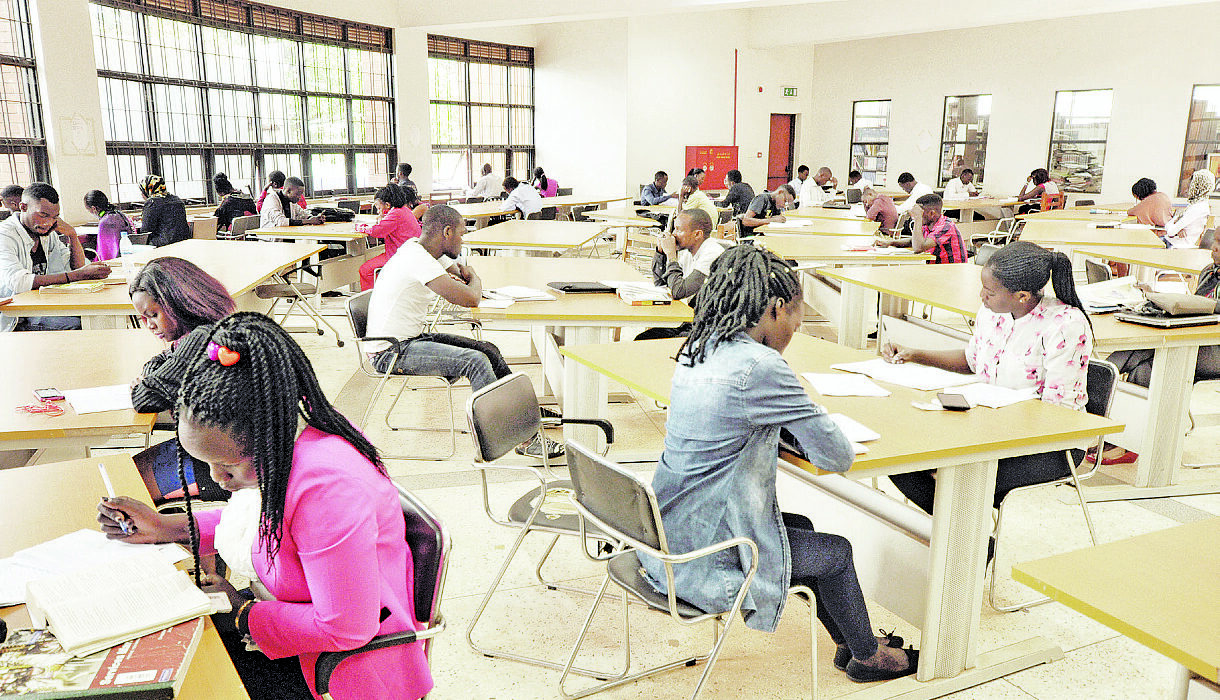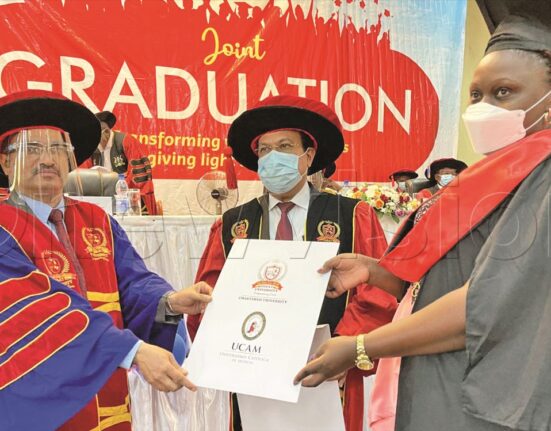(This article was first published in the New Vision on July 7, 2021)
By Conan Busingye
The Government has resolved to start giving continuing university students funds to complete their studies under the Higher Education Students Financing Board, commonly known as the loan scheme.
These are the students who are self-sponsored in institutions of higher learning, which are privately owned, but chartered and or Government-owned. This means students can join the scheme in their second, third or fourth year of study.
This is part of the Government’s planned move to expand the students’ loan scheme, which started seven years ago.
The scheme report, which New Vision has obtained, shows that it will start with about 500 students, on top of the 2,500 that the scheme is planning to enrol on the programme.
Michael Wanyama, the executive director of the scheme, has also confirmed that “for the first time in the history of this scheme, we will be taking on some continuing students.” Todate, about 6,700 students are being supported by the programme and some already graduated.
Genesis
The main objective of the students’ loan scheme is to increase equitable access to higher education in Uganda and also support qualified students who may not afford the cost.
The scheme is only for students enrolled in selected universities and tertiary institutions.
Students with disabilities, unlike other applicants, can also pursue humanities. The rest are only supported on condition that they do sciences and are admitted to an accredited university.
The state minister for higher education, Dr John Chrysostom Muyingo, says there is a high dropout rate of students due to tuition and other cost-related issues.
“The support to university students, especially those who have already joined, is an additional assurance that there is increased access to higher education in the country,” Muyingo explains.
The minister is right, because according to the 2020 ‘Africa Higher Education Students Survey Project,’ done by UNESCO, almost 30% of all students in Uganda, who join university education on various degree programmes in different universities, do not complete their courses on time or drop out.
In a recent study done by Jessica Norah Aguti, Dorothy Nakibuuka and Richard Kajumbula on determinants of students’ dropouts from two degree programmes at Makerere University, it was found that the rate of students dropout ranges between 34.8% and 83.9% for the bachelor of education programme and between 40.7% and 59.8% for the Commonwealth Youth Programme diploma in youth in development work.
The dropout rate is not massive for most of the science courses as compared to humanities, where majority of students are admitted, according to the former executive director for the National Council for Higher Education, Prof. Abdu Kasozi.
Unfortunately, humanities are not covered by the loan scheme.
Muyingo explains that dropping out of university means students leaving before completing the courses they applied and registered for.
Most universities identify a student as a dropout if the individual is absent without an approved excuse or documented transfer and does not return to the university by the fall of the following year or if he or she completes the school year, but fails to re-enrol the following year.

Beneficiaries Hit 10,000 Students
Launched by President Yoweri Museveni in the 2014/2015 academic year with 1,201 beneficiaries, the numbers have steadily increased to 10,041 in 2019.
The beneficiaries pursue 130 degree programmes and 76 undergraduate diploma courses, mainly in science, technology, engineering and maths (STEM).
Why Care?
The students’ loan scheme is helping many access education and would have dropped out if there was no such funding.
Studies show that the high student dropout and failure rates, with accumulated retakes on exams, are a major problem in a country with limited state resources, a desperate shortage of high-level skills and a pressing need to raise income levels among the poor.
Prof. Badru Kateregga, the former chairperson of vice-chancellors in Uganda, says: “There is a high dropout rate in universities, partly because of tuition and other economic and social-related issues. Students, especially girls, encounter so many problems and this is gradually affecting our country’s university education. Something just has to be done.”
At Makerere, the study done by Aguti, Nakibuuka and Kajumbula shows that although the students may have enrolled for programmes with great enthusiasm, they often fail to register or complete the programmes. “If this dropout rate is not addressed, it might discourage many potential applicants for courses, thus posing a problem to the success of various programmes.
Their study was carried out to examine the determinants of students dropout on the two programmes, specifically focusing on socio-cultural, financial constraints and environmental factors as contributors to the dropout.
Researches note that socio-cultural and financial factors mainly contribute to students dropout.
Other reasons included environmental factors, such as the teaching and learning environment, transfers from one workplace to another, loss of jobs, demanding jobs, sickness and a feeling of isolation.
Pregnancy, alcoholism, waste of time by students, misappropriation of tuition fees and too much partying are some of the other more critical reasons why students drop out.
Most students argue that the unsuitable lecture rooms, lack of reading materials and undergoing tests and examinations after a crash course, are the four most important teaching and learning environmental factors that can lead to drop out.
Some said lecturers tended to intimidate them.
Family background was another social factor that led to student dropouts, according to the research by Aguti and other counterparts.
About 83.7% of the students agreed that their family background contributed to dropout, while 17.3% disagreed.
There has also been an argument that since tuition fees were introduced in public universities in sub-Saharan Africa, sexual harassment has been on the increase; a reason why some girls give up their courses or end up pregnant.
Joy Constance Kwesiga, the vice-chancellor of Kabale University, in her study, Women in contemporary African higher education – The doors have been left ajar, notes that despite the recognised expansion in higher education, there is evidence that students drop out due to their inability to pay tuition fees.
State funding and other offers of scholarships rarely take into account students’ background, thus disadvantaging further the vulnerable. It is for this reason that the more recent interventions have had to review funding criteria.

Other students drop out because they cannot afford tuition fees as the Government scholarships are taken by students from well-to-do families.
Unfortunately, studies show that most of the Government scholarships, save for the students loan scheme, are always won by students from well-to-do families, who have been in the country’s most expensive schools.
A 2016 study carried out by the education ministry revealed that out of over 700 government-aided schools, 139 elite Government schools, with high fees contributed 59% of the total enrolment on Government scholarships to Makerere University the largest public university) from 1996-2000. The richest 1% of society accessed over 40% of available positions at Makerere and other universities.
“The teaching and learning environment, student and staff welfare, campus security, governance and administration and the general organisational culture have not adapted sufficiently to attract and retain women participants,” notes Kwesiga.
“How do institutions ensure good performance, retention, recruitment to graduate programmes and to staff cadres, as well as upward mobility of academics and managers? Failure to respond to women’s needs along this continuum demonstrates inaccessibility,” she adds.
“So far, fewer than 12% of female lecturers are employed in over 100 universities in sub-Saharan Africa,” says Dr Wangul Njau, a leading researcher on women’s education at the Centre for Adolescent Studies.
Njau says female students are victims of the unfriendly seminar culture, a lack of security and early marriages. Sources at the University of Nairobi conceded that the problems with men were growing.
“Financial constraints and fear of failing as a result of poor academic performance, have thrown girls into the hands of randy lecturers,” they say.
How Student Loan Scheme Will Benefit Continuing Student
Student’s loans are provided majorly:
• To increase equitable access to higher education for all Ugandans
• To support qualified students who cannot afford higher education
• To ensure regional balance in higher education services for all Ugandans
• To develop and support programmes which are deemed critical to national development
• To ensure a sustainable revolving loan fund
Eligibility into the scheme:
The Higher Education Students’ Financing Board currently supports students pursuing diploma and undergraduate programmes. Plans are underway to finance post-graduate programmes and doctoral studies in the near future.
The scheme is meant for Ugandan students seeking financial assistance to pursue an accredited programme of higher education in an accredited higher education institution recognised by the National Council for Higher Education.
The board determines the students’ eligibility into the scheme, taking into account regional balance, gender, social-economic needs and equity.
What does the loan cover?
It is important to note that the students’ loan scheme is a cost-sharing arrangement, where the loan covers the academic component of a student’s needs — tuition, functional and research fees, as well as appliances for persons with disabilities PWDs).
What courses are covered?
The board approves the programmes of study to be funded every academic year. Currently, all accredited science, technology, engineering and mathematics (STEM) programmes in accredited universities and other tertiary institutions are catered for. It is only PWs that are eligible to pursue either sciences or humanities and economics programmes.
SOLUTIONS
Prof. Badru Kateregga, the former chairperson of vice-chancellors in Uganda, says the Government needs to urgently unveil the loan scheme to help students who fail to graduate due to lack of tuition.
Joy Constance Kwesiga, the vice-chancellor of Kabale University, notes that mentoring systems have often been recommended as a means of improving the situation of minorities. A recent model at Makerere University has been the student peer trainers.
The scheme has enabled those in charge of administration of students’ affairs to serve better and has given students a sense of belonging and responsibility.
“It has also resulted in fewer dropouts and averted poor performance due to social unpreparedness, as well as improved relations between staff and students,” she notes.
Kwesiga notes that there should be advocacy for more decentralisation of face-to-face sessions and other support activities, such as registration, so that services are provided nearer to the students, hence reducing their expenses.
More so, there are also plans for the scheme to start giving loans to students doing masters and doctorate in philosophy.
In the future, the scheme plans to also pay a welfare allowance to students.
Michael Wanyama, the executive director of the scheme, says: “When it starts, students will have their accommodation and meals catered for on a loans basis. They will get loans for their tuition, functional fees, research, aids and appliances for persons with disabilities.”
In the past, the scheme would only cater for Senior Six leavers and of that, the previous year of sitting. Students who would have missed a year or those who had already started their studies would not be allowed to apply for this scheme.
Wanyama says: “We hope we can get more funds to cater for accommodation, postgraduate and continuing students soon.”









Leave feedback about this